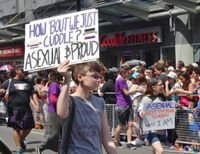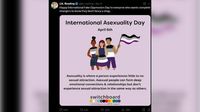On April 6, 2025, International Asexuality Day, J.K. Rowling sparked controversy with her remarks on social media platform X, dismissing the day intended to recognize and celebrate asexual individuals. In a tweet that many found offensive, she wrote, "Happy International Fake Oppression Day to everyone who wants complete strangers to know they don’t fancy a shag." This comment drew immediate backlash from the LGBTQ+ community and allies, who criticized her insensitivity towards asexuality, a valid sexual orientation defined by PFLAG as an individual who does not experience sexual attraction.
Rowling's comments come amidst ongoing scrutiny regarding her views on various sexual orientations, particularly as they relate to the LGBTQ+ community. According to Medical News Today, an estimated 1% of the population identifies as asexual, which translates to over 70 million people worldwide. Despite this, Rowling's dismissive tone raised questions about her understanding and acceptance of asexuality as a legitimate identity.
In response to the backlash, Rowling seemed unfazed, stating, "I want an International Bored Of This Shit day," which only added fuel to the fire of criticism directed at her.
Following her initial tweet, Rowling turned her attention to another contentious issue: transgender rights. After the Daily Mail UK reported that a nurse was suspended for referring to a convicted transgender sex offender as "he," Rowling commented, "This is obscene. The NHS is about to waste yet more taxpayers’ money by trying to vilify a dedicated nurse for knowing a man when she sees one." This statement further solidified her reputation for engaging in polarizing discussions about gender identity and the rights of transgender individuals.
In the midst of this controversy, Rowling faced backlash not only for her comments about asexuality and transgender individuals but also for her response to criticism regarding her age. After receiving several derogatory comments about being "old," she retorted, "I hate to disappoint, but you don’t turn me into a quivering heap of anguish by telling me I am, or look, old. I’ve lost too many people too young to feel anything but celebratory about still being around in my sixtieth year and if you’re lucky, you’ll feel that way one day, too." This statement reflects her resilience in the face of criticism, yet it also highlights the ongoing tensions surrounding her public persona.
Rowling's remarks have drawn ire from various quarters, including from commentators who argue that her views may embolden discrimination against marginalized groups. Alyssa Steinsiek, a writer for a popular online platform, expressed her frustrations with Rowling, stating, "I don’t want to draw more attention to Rowling herself than feels necessary. I do care that the doubts she raises about asexual people’s inclusion in the queer umbrella might be picked up and echoed by helpful idiots who otherwise consider themselves allies to our community." Steinsiek emphasized the importance of understanding asexuality as a spectrum, where individuals may experience sexual attraction differently or not at all.
The Trevor Project's 2020 National Survey on LGBTQ Youth Mental Health found that 10% of LGBTQ+ youth identified as asexual, with demisexuality and panromanticism being the most common identifiers among this group. The survey also revealed that asexual youth reported higher rates of depression and anxiety compared to their peers in the broader LGBTQ+ community. Additionally, 41% of asexual youth identified as transgender or nonbinary, showcasing the intersectionality within this community.
Unfortunately, asexual individuals often face discrimination and harassment. A report from the volunteer-run Ace Community Survey Team indicated that 71.2% of asexual respondents reported experiencing discrimination due to their identity, which can manifest in various forms, including verbal abuse and unwanted sexual advances. Such experiences highlight the urgent need for greater awareness and acceptance of asexuality within society.
Rowling’s comments have sparked a broader conversation about the representation and understanding of diverse sexual orientations. Many advocates argue that the asexual community deserves recognition and respect, just like any other sexual orientation within the LGBTQ+ umbrella. The push for inclusivity is essential, as asexual individuals, like all members of the LGBTQ+ community, face unique challenges and discrimination.
As discussions about asexuality and LGBTQ+ rights continue, it is crucial for public figures, including Rowling, to approach these topics with sensitivity and awareness. The impact of their words can resonate deeply within communities that are already marginalized. Acknowledging and respecting the diversity of human experiences is vital in fostering a more inclusive society.
While Rowling may have her own views, the backlash she faces serves as a reminder of the importance of compassion and understanding in discussions about identity. As society evolves, so too must our conversations about sexuality and gender, ensuring that everyone, regardless of their identity, feels seen and valued.



